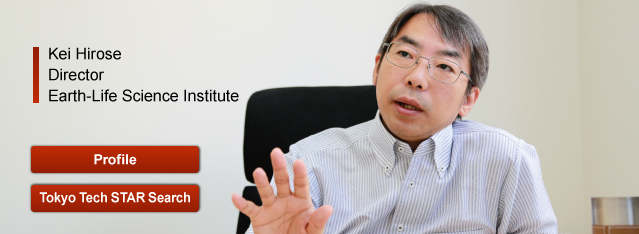Message
Message from the Director

The fundamental question that has driven our earliest scientists, the Greek natural philosophers, has been: when and where did life originate and how did it evolve? We at the Earth-Life Science Institute have a grander aim of exploring both the origin of the Earth as well as the origin of life. Until recently, discussions concerning the origin of life have mostly been limited to the biochemistry of proto-life forms. But life is a phenomenon that is sustained through the exchange of energies and materials from its surrounding environments and, as such, we must take into context the early Earth's environment that allowed for life to arise and interplayed in its subsequent changes. As our Institute's name reflects, we strongly believe that the origin of life question cannot be separated from the origin and evolution of the Earth. We therefore will approach our mission from the dual sides of Earth and Life, by integrating research from Earth and Life sciences.
We know that the early Earth's environment was very different from what it is now. Our oceans then, for example, probably consisted of hydrochloric or sulfuric acid. An important goal in our research will be to clarify the initial ecological system that allowed for a stable and persistent existence of life even under the various harsh and violent changes of the environment at the beginning of Earth's history. Given that no direct evidence exists of early Earth's environment, we will approach this problem from two directions: forwards, using theoretical models of the formation of the Earth, and backwards, by tracing back geological records.
The forwards approach starts with the origin of the Earth. Through the theory of planet formation and making use of the world's cutting edge computer simulation technology, the formation process of the Earth in the solar system will be modeled from first principles. In addition, by utilizing high pressure and high temperature experiments that are my lab's world leading specialty, we will investigate the materials differentiation of the Earth and replicate its core, mantle, crust, atmosphere, and oceans.
The backwards approach will use the 165,000 samples of geological records stored in our Tokyo Institute of Technology's Museum of Evolving Earth. We will investigate the changes in the environment back to 3.5 billion years, and make our best estimate as to what the Earth was like in the Hadean Eon. In addition, we will draw upon the information we do have of the early solar system, as well as look at locations such as deep-sea hydrothermal systems and hot springs as they are similar to the environments in early Earth. We will supplement our research that is based on theory and experimentation with an empirical approach that will open more possibilities to understanding the beginnings of life as nurtured in its early Earth context.
Drawing from our research of the early Earth environment, we can determine the supply of nutrients and energy that was available, which would bring us closer to identifying the circumstance that gave birth to life. What was this initial life like? In the field of genome science, the relations between specific environmental factors and microbial gene pool are being documented and stored in data bases. We will utilize these to estimate the "initial genome" of life born in a special environment on early Earth. We will also attempt to reconstruct one of the initial cells by using a synthetic biological approach.
Our research that links Earth and Life will allow us to understand what was special about our Earth, as the planet where life originated, that ultimately gave rise to our existence. I believe our research will also contribute to a wider understanding of the universality of life and its possible modes of origin on other planets, in our solar system and beyond. In the internal oceans on the icy moons of Saturn's Enceladus and Jupiter's Europa, there is a possibility of the existence of life. In the 1000 or so planets that exist outside of our solar system, there may well be conditions that are fit for giving rise to and nurturing life and we will proactively contribute to space exploration projects. By pursuing our research that elucidates the dynamic interplay of early Earth's environment and the rise of initial life and its subsequent evolution to complexity, we will learn not only about ourselves on our planet but also of the greater possibilities in the solar system and beyond.












